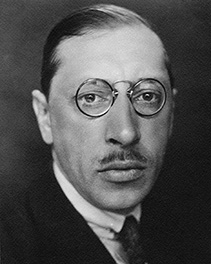"Banned and Forbidden - Prohibited Musical Masterpieces" and Prohibited Speech
September 10, 2019 | Brandy Gottlieb | casshcommunications@uwf.edu

As a Jewish émigré from Nazi Germany in 1934, Fred Seligman cherished the freedoms protected by the First Amendment of the United States Constitution. Having experienced the challenges of a nation at war, Mr. Seligman understood the dilemmas that nations like the United States face in protecting these freedoms. While conscious that our liberties are always fragile, Mr. Seligman believed that the continued protection of freedom requires strong institutions of government respected by its citizens.
Citizens under various regimes during the 1800s and 1900s have not always been fortunate to acquire the same freedoms. On September 12th, the Seligman First Amendment Lecture Series will feature "Banned and Forbidden - Prohibited Musical Masterpieces," an exploration of banned expression during oppressive regimes. Join as UWF faculty bring this program to life.
Here, Drs. Leonid Yanovskiy and Victoria Adamenko offer insight into the regimes and impact on these composers, musical masterpieces and prohibited speech.
Today, we customarily take freedom of artistic expression for granted, but there were periods in recent European history when such freedom was denied." - Dr. Leonid Yanovskiy
"Banned and Forbidden - Prohibited Musical Masterpieces" features music and poetry banned from performance and publication by oppressive regimes: Nazi Germany and the Soviet Union. In the 1930s and 1940s, these two regimes, while enemies with each other, were similar in their restriction of political freedom and artistic expression. Classic American liberalism during this time was the force that supported artistic freedom. Therefore, many émigré artists sought refuge in America.
In 1933, the German National-Socialist government founded the State Music Bureau, whose task was to promote “good German music.” The bureau successfully banned such “degenerate music” as Jazz and the music of Jewish-by-birth composers, like Gustav Mahler (1860-1911), Felix Mendelssohn (1809-1847), Arnold Schoenberg (1874-1951), and Kurt Weill (1900-1950); the music of political dissidents, like Alban Berg (1885-1936); and finally, the music the Bureau functionaries considered savage or excessively sexually suggestive, such as the works of Paul Hindemith (1895-1963) and Igor Stravinsky (1882-1971). Kurt Weill was a popular Jewish composer and an easy target for the Nazi authorities. The government interfered with performances of his stage works, and in 1933, Weill fled the Nazis and moved to Paris, London, and finally, New York.
In the Soviet Union (1917-1991), the government was banning, prosecuting, killing, or forcing into artistic silence composers, poets, and artists by the hundreds.
In the Soviet Union (1917-1991), the government was banning, prosecuting, killing, or forcing into artistic silence composers, poets, and artists by the hundreds. The Russian composer Igor Stravinsky was not harmed personally, because he moved to Switzerland, France, and later the US, but authorities in both the Soviet Union and Nazi Germany banned his music. Ironically, while the Bolsheviks outlawed him as a representative of “the decadent ideology of the imperialist bourgeoisie,” the fascists banned him as the leader of the “decadent cultural Bolshevist tendencies in the art.” In 1936, the Soviet government reprimanded another “proponent of bourgeois formalist music,” the Soviet composer Dmitri Shostakovich (1906-1975). Shostakovich narrowly avoided arrest by publicly apologizing for his “mistakes” and promising to do better. After his second denunciation and banishment in 1948, Shostakovich awaited his arrest at night, by the elevator outside his flat, so that his family would not be disturbed. He never was arrested, since Stalin seemed to enjoy a game of “cat and mouse.” A more severe fate awaited Russian poet Osip Mandelstam (1891-1938), whom the authorities arrested, tortured, sent to Siberia, released, and finally sent to perish in a Soviet concentration camp.
On September 12th, we will perform the works of three composers and one poet, but with great sorrow and love, we dedicate this recital to the memory of all the artists who, in their own times, kept alive the hope of liberty, and who—with any luck—might help us follow the path of righteousness.
Authored by Drs Leonid Yanovskiy and Victoria Adamenko
Join for the performance Thursday, September 12 at Old Christ Church in Pensacola from noon- 1 p.m.
The Seligman First Amendment Lecture Series has fostered dialogue about First Amendment issues by uniting the University and local community in meaningful conversation and is made possible by a generous gift from the Jane G. and Fred K. Seligman Endowment.
For more information about additional events in the series, visit uwf.edu/seligman.






